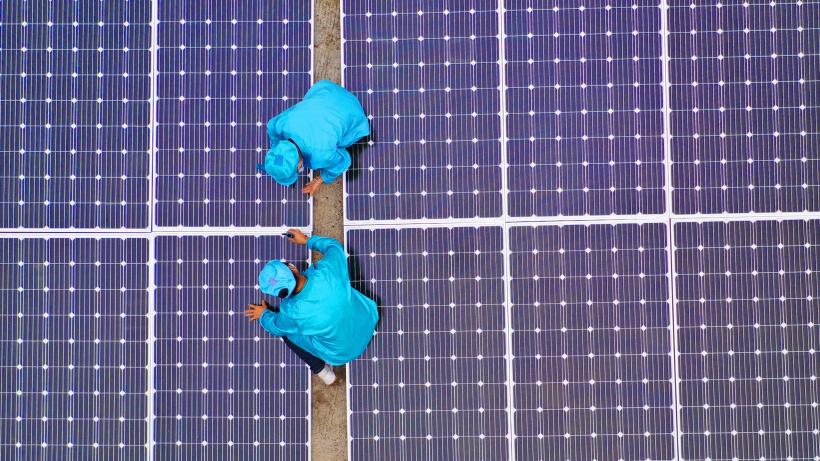
Four ideas to bring clean power to fragile states
Energy access has the potential to catalyse enormous social and economic gains in fragile states. Below are four ideas from global leaders to make this a reality.
Affordable and reliable electricity is critical to improve education, health, and job creation, and can contribute significantly to peace and stability. Without it, fragile countries will be left even further behind from the direct and indirect effects of COVID-19.
On 24 February, the Council on State Fragility and G7+ launched their Call to Action Powering up energy investments in fragile states. Below are four key ideas to expand access to clean energy in fragile and conflict-affected countries shared by panelists at our launch event: Ellen Johnson Sirleaf, Former President of Liberia; Maeen Abdulmalik Saeed, Prime Minister of Yemen; Francis M. Kai-Kai, Minister of Planning and Economic Development for Sierra Leone and Chair of the g7+; and Namita Vikas, Founder of auctusESG.
You can read more about the Call to Action and why it’s needed in our previous blog.
1. The vital role of fragile state governments
The role of governments is critical. You can’t overemphasise that. – Minister Kai-Kai
For investments in clean energy to be truly transformational, governments of fragile states must play a leading role. Governments particularly have a role in developing and implementing national strategies and frameworks to set their priorities for energy access, and enabling and incentivising public-private partnerships that can deliver impactful clean energy projects to the people who need them most. Governments face hard choices in deploying limited resources, and development partners and private companies need to work with the energy priorities of governments in fragile states, not around them.
By signing onto the Call to Action, the 20 member countries of the g7+ Group of fragile and conflict-affected countries emphasised their commitment to clean energy and are natural partners for development institutions and private sector interested in investing in fragile states. These countries have immense potential for growth and achieving self-reliance – natural resources, young populations, and favourable climates for clean energy.
2. The promise of clean energy for rural areas
Decentralised, renewable energy systems such as solar mini-grids hold great promise for rural areas, which often have very limited access to central grids. In Sierra Leone, for example, only 6% of the rural population has intermittent access electricity. In Yemen, conflict has devastated the energy sector, but in its place, a local solar energy industry has grown to help meet the demand for electricity. While these local solutions are not nearly enough to meet the energy needs of the country, solar mini- and micro-grids have been particularly successful in small communities that require much less energy than cities.
Clean energy investments by development partners and private companies could make a huge difference to rural populations that have much less political influence on national energy policy than urban populations.
3. Replicable models
Replicable models for clean energy investments in fragile states are key to incentivise private sector investment. Coalitions involving multiple stakeholders from the public, private, and non-profit sectors can help leverage and provide replicable models, aiming to establish a common set of principles on energy investments in fragile states. Exploiting replicability has been particular successful, for example, in the financial technology (‘fintech’) boom in Africa and spreading access to poor communities.
One notable example is a UK Foreign, Commonwealth and Development Office (FCDO) project in Sierra Leone implemented by the UN Office for Project Services (UNOPS) that is providing solar mini-grid systems for small, remote rural communities and is expected to directly benefit around 360,000 people. The project has a key aim of having private sector partners invest, operate, and maintain power generation and distribution equipment.
4. Collective action
Global collective action, as envisioned by the Call to Action, is necessary to ramp up energy investments in fragile states to truly change lives. Global leadership to ensure fragile states are prioritised in international forums and initiatives such as the G7 Summit, COP26, and the UN Global Goals is critical.
Global funds targeted at accelerating developing countries’ transitions to low carbon energy and achieving Sustainable Development Goal 7, such as the Green Climate Fund, could play an important role in unlocking capital for fragile states.
The Call to Action is a first step in galvanising collective action but must be backed by concrete commitments by its signatories to make widespread access to clean energy a reality in fragile states.
The pandemic is a clarion call to come together, to work together to overcome our common challenges. – Ellen Johnson Sirleaf
Watch the launch event in full below.
Together with the Call to Action, the Council on State Fragility has released a policy paper on scaling energy access in fragile states.

